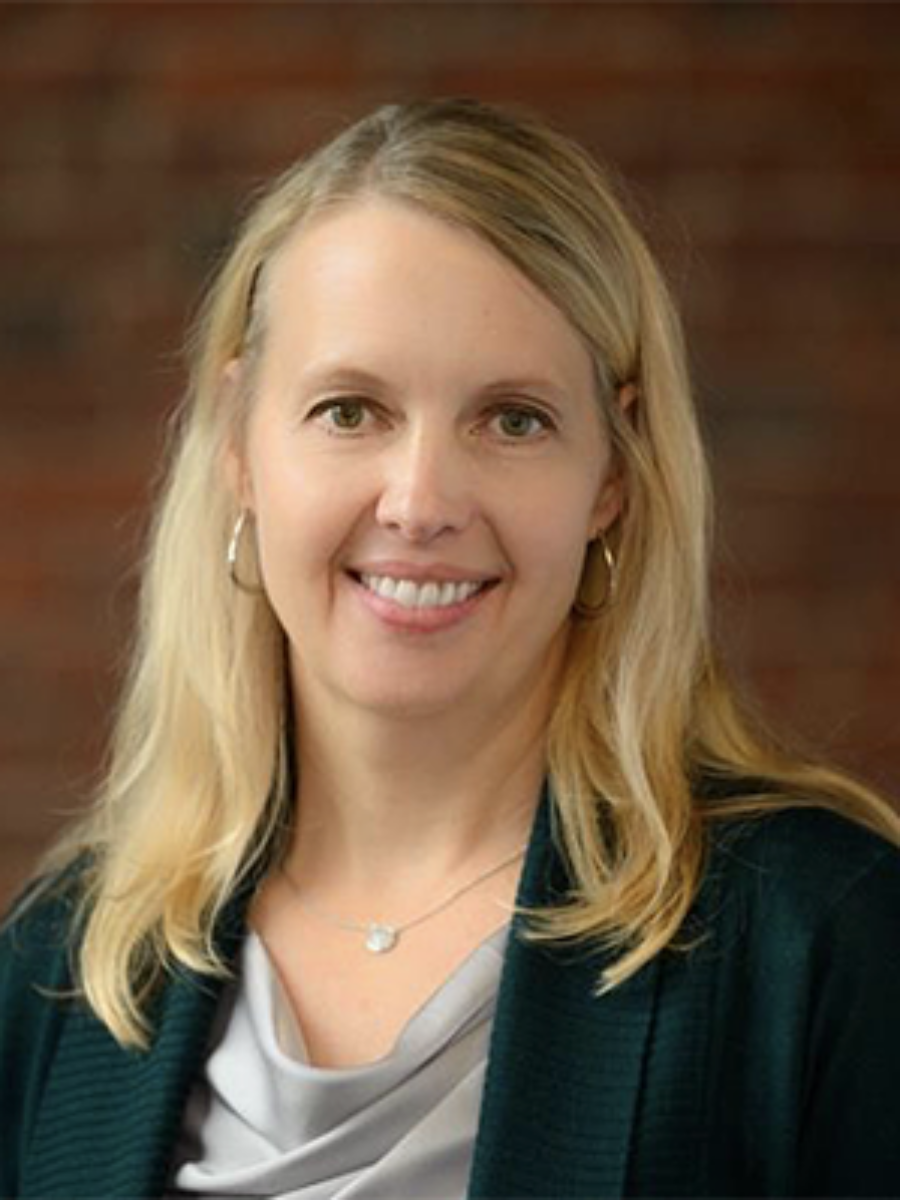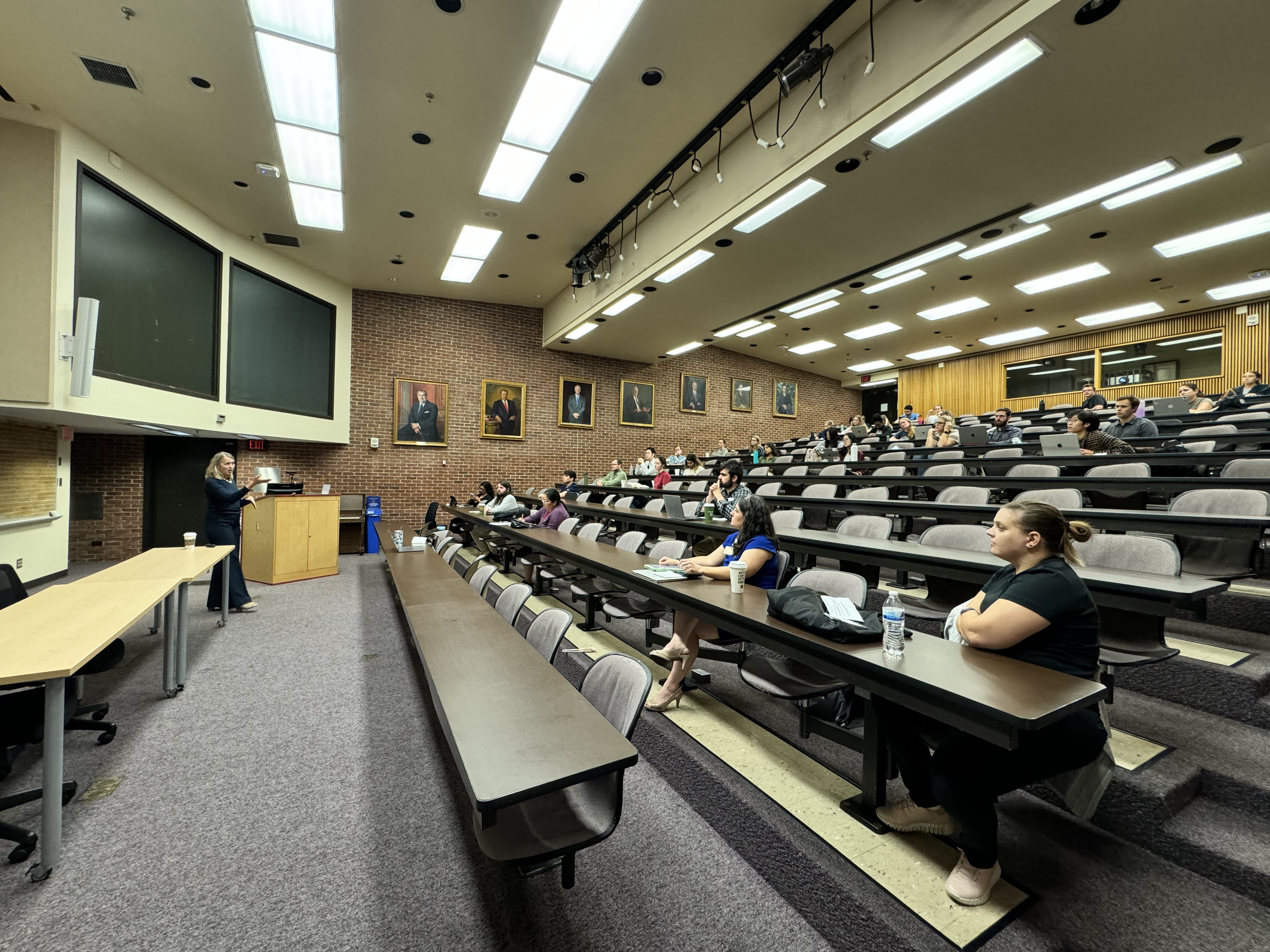Lori Rudolph-Owen, an accomplished figure in the biotechnology industry and a School of Medicine Basic Sciences alum, shared her insights on career progression and drug development on Oct. 3 as part of BRET’s Ph.D. Career Stories, a series focused on various alums and their professions. With decades of experience spanning both early drug discovery and clinical development, Rudolph-Owen’s narrative offered a valuable glimpse into the complexities and opportunities within the biotech and pharma sectors.

Olof Isberg, a postdoc in the Department of Cell and Developmental Biology, introduced Rudolph-Owen to a crowd of attentive listeners interested in pursuing careers in a variety of drug discovery companies.
“Lori has taken a path that I am really inspired by,” Isberg said. “I want to know: Did she always know what she wanted to do?”
The simple answer was no. “It was a process,” Rudolph-Owen said, garnering laughs from the audience. It took her many years of experience to get to where she is today: at a 4:59 NewCo, a 5AM Ventures Company, as the Chief Development Officer.
To provide some background to the audience, which was filled with graduate students and postdocs, Rudolph-Owen first gave an overview of different types of companies she has encountered over her 25-year career, spanning from early-stage startups to established pharmaceutical giants. She explained that startups often begin in what’s known as “stealth mode,” where there is an initial concept and seed funding typically provided by a single venture fund, but often with no formal name or additional substantial backing from other sources. The 4:59 NewCo. company that Rudolph-Owen works at, for example currently operates in stealth mode as its primary innovation—a breakthrough in chemistry—is in the process of being patented.
Rudolph-Owen transitioned from the bench to a role in development after she was made responsible for determining the objective of a program for Millennium Pharmaceuticals that was about to initiate a phase I clinical study. Her interaction with the other Millenium Pharmaceutical development team members on this project made Rudolph-Owen realize that development was an attractive option for her and led her to pursue a position as a development program manager at Vertex Pharmaceuticals.

“I took a step back in my career, both in salary and title because [development] was something I wanted to pursue,” she said. “I took a risk.”
It is safe to say that taking that risk paid off. Rudolph-Owen’s career shift allowed her to develop the operational skills needed for higher-level leadership roles. In her current role as CDO at a 4:59 NewCo., Rudolph-Owen is responsible for all development-related strategic and operational aspects of the pipeline, and she oversees a wide array of activities, including toxicology, clinical development and operations, regulatory affairs, and chemistry, manufacturing, and controls.
“I am kind of like an air traffic controller,” she said. “I understand all of these areas and I can dive into each of them when I need to.”
Throughout her career, Rudolph-Owen has followed one mantra: keep one foot in something you can do with your eyes closed, and the other one in something that you have no idea how to do. When she first started as a senior vice president of research and development strategy and operations at Goldfinch Bio, for instance, which focused solely on treatments for kidney disease, she had no prior experience in developing kidney therapies, but had complete confidence in her ability to oversee programs and manage portfolios and had deep knowledge in regulatory and clinical operations.
She has expanded her skillset by following this mantra, and believes that some of the most important skills to have are the ability to think, solve problems, reason, and ask questions. “That is the most beneficial thing you can bring” to an employer and throughout your life, she said.
Rudolph-Owen concluded her talk by offering attendees more advice: be honest and happy with yourself. Be open to learning and other people’s suggestions. Keep your head up and eyes open. Be honest with yourself about what you want.
“I’ve had countless people say, ‘You’re female. You should be a CEO,’ but I don’t want to be a CEO and deal with financing issues,” she said. She enjoys being in the operational trenches, developing a company’s strategy while building strong teams and relationships.
For young scientists considering a transition to industry, Rudolph-Owen stressed the importance of networking and tailoring oneself to prospective employers. Trainees need to articulate how their skills can add value to a company, she said. Rudolph-Owen encouraged attendees to attend conferences, connect with industry professionals on LinkedIn, and take advantage of internships or informational interviews.
Reflecting on her future, Rudolph-Owen described her current role as likely her “last full-time operational position.” However, she expressed excitement about remaining involved in the field through consulting and board positions. She is currently on the School of Medicine Basic Sciences Council of Visitors, which supports and fosters the achievement of excellence in all aspects of research, teaching, and career development for the students, staff, and faculty members of our departments, programs, and centers. She is also a board member at Codagenix, a privately held biotech company dedicated to combining live-attenuated virus design with cutting-edge codon deoptimization technology to transform global health.
Rudolph-Owen’s journey highlights the dynamic nature of careers in biotechnology, demonstrating that success in the field often depends on a willingness to take risks, learn new skills, and embrace change.